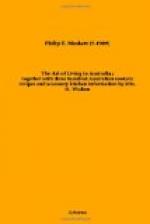in a cool place till the next day. If it has
been carefully made it will be in a jelly; the fat
can very easily be removed with a spoon. It should
finally be wiped with a damp cloth. Removing
the fat thoroughly is a most important item, for greasy
soups and sauces are most indigestible and unwholesome.
If the stock has to be used at once, remove the fat
first with a spoon, and then pass pieces of this paper
lightly across the surface; these will absorb the
fat. A small piece of charcoal laid on top of
the stock will prevent it turning sour in the hot
weather. With this basin of stock to work on,
many dainty tit-bits are possible which could not be
made without it. How often has the cookery book
been searched for “something nice” and
laid down with a sigh when half a pint of gravy has
been found necessary to concoct the desired dainty!
But with a basin of stock on hand, all these things
are procurable, and it certainly does not take more
than ten minutes to break up the bones, skim the pot,
and strain it, and last of all it costs nothing.
In cases of sudden emergency, when stock is wanted
and is not to be had, the recipe for Quick Beef Tea
answers very well, using one quart of water instead
of one pint, and by adding a few vegetables; this
is made in five minutes. White soup is looked
upon as quite a high-class soup, but it is just as
easy to make as any other kind. A piece of stewed
veal or mutton, or a boiled chicken, gives the stock
at once, or the bones of mutton, veal, or pork alone
will form the foundation. Never throw away the
water in which carrots, parsnips, celery, or even
cauliflowers have been boiled. Vegetables contain
a great deal of potash, which is a valuable food for
the blood. A great deal of this potash comes out
in the water during the process of cooking; if this
liquor is used as a foundation for soup, we utilize
this. For this reason vegetable soups, and stews
containing plenty of vegetables, are such a good diet
for anyone suffering from or subject to diseases of
the blood and bones. These simple facts seem
to be overlooked; but if Australia is to become in
the future, as we all hope it may, a power in the world
second to none, the wives and mothers of her husbands
and sons must understand the necessity of providing
them with a diet which shall make them strong and
brave, and root out what now seems to be the curse
of the land— dyspepsia—brought
on in a great measure by badly cooked and therefore
indigestible food. The remedy for this is in the
hands of the women of Australia, and if they will
rise to their position and importance and do their
work with a high and holy motive, they will not find
it the drudgery it is often supposed to be. What
does Owen Meredith say?—
“We may live without poetry, music, and art,
We may live without conscience, and live without heart,
We may live without friends, we may live without books,
But civilised man cannot live without cooks.
He may live without books—what is knowledge
but grieving?
He may live without hope—what is hope but
deceiving?
He may live without love—what is passion
but pining?
But where is the man that can live without dining?”




